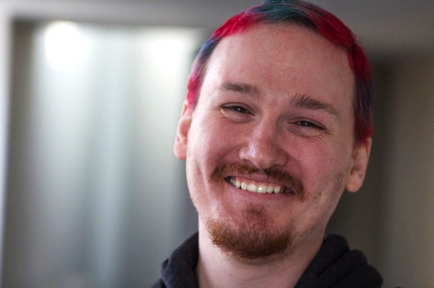はじめまして!私はマシュー・ラニガンです。2011年アメリカのオハイオ大学を卒業し、数年ソフトウェア・エンジニアととして働いていましたが、日本語教師になりたくて、大学院に進学することに決め、2014中部大学大学院国際人間学研究科に大西良三大学院特別奨学生として入学しました。前から日本のアニメに興味があったので、アニメを使った日本語教材を開発しようと思いました。それを目指して、(1)アニメの日本語は日常的に使われている日本語とどう違うか、(2)アニメは日本語教育の教材の資源としてふさわしいか、そして(3)どのようにすれば日本語教育にアニメを役立てられるか、という三つの質問を研究課題にしました。ですが、データの量が多すぎて、分析するのが大変だったので、「Co-Chu」と名付けたたくさんのデータを早く分析するためのプログラムを開発し始めました。最終的にCo-Chuの開発を研究の中心にして、修士論文のタイトルが「アニメの日本語と日本語教育―Co-Chuによる現実性および適切性分析―」になりました。2016年に卒業してから、またソフトウェアエンジニアに戻りましたが、大学院で身に着けた論理的な考え方などを生かして、今でもCo-Chuの開発を進め、共同研究者となった先生たちと一緒に年に数回学会で研究について発表をしています。

Hello! My name is Matthew Lanigan. I graduated from Ohio University in 2011 and went on to work as a software engineer for several years but decided to go back to school and learn to teach Japanese. In 2014 I enrolled in Chubu University’s Graduate School of Global Humanics and was accepted as the first recipient of the Ryozo Ohnishi Graduate Fellowship. I have long had an interest in anime and that developed into a desire to create Japanese language teaching materials using anime. To that end, I chose three questions as the target of my research: 1) How does the Japanese used in anime differ from that used in everyday life? 2) Is anime suitable as a resource for the development of Japanese language teaching materials? and 3) How would anime best be used in the Japanese language classroom? However, the amount of data needed to perform such an analysis was so great that the analysis proved to be quite difficult; that led me to begin development of a program which could analyze a large amount of data very quickly, which I eventually dubbed “Co-Chu”. In the end, I gradually made the development of Co-Chu into the primary focus of my research and titled my master’s thesis “The Japanese of Anime and Japanese Language Education: Realism and Appropriateness Analyses Using the Corpus System Co-Chu”. After graduating in 2016, I returned to a software engineering, but I still use the logical, scientific thinking that I learned in graduate school every day and continue to develop and present at conferences about Co-Chu with my professors who have become collaborating researchers.

